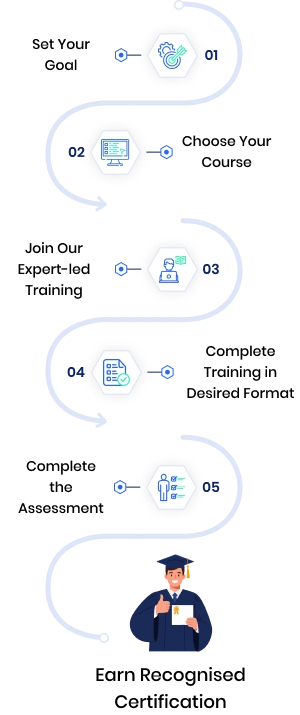Course Overview O v e r v i e w
- Course Overview
- Course Outline
- What’s Included
- What You’ll Learn
- Exam Details
Agile Business Analyst Foundation and Practitioner (AgileBA®) Overview
The AgileBA® Foundation and Practitioner Course equips learners with the skills to perform business analysis within Agile environments. It covers key concepts such as Agile frameworks, stakeholder engagement, requirements management, and iterative delivery.
Formal training helps professionals bridge the gap between business needs and Agile project outcomes, improving adaptability and communication. It also prepares learners for both the AgileBA® Foundation and Practitioner exams, demonstrating proficiency in Agile business analysis.
At Training Deals, we offer AgileBA® Foundation and Practitioner Training that is practical, structured, and exam-focused. Our expert trainers deliver engaging sessions using real-world Agile case studies. With affordable pricing and dedicated learner support, we help you master Agile Business Analysis practices.

Agile Business Analyst Foundation and Practitioner (AgileBA®) Outline
Module 1: Role of the Business Analyst in an Agile World
Holistic View of the Business
Structure of Business Organisation
Understanding the Business Environment
PESTLE Analysis
Poster’s Five Forces Analysis
MOST Analysis
Resource Audit
SWOT Analysis
TOWS
Porter’s Value Chain
Lean Thinking
McKinsey 7S Model
Balanced Business Scoreboard
Core Considerations When Planning and Implementing Change
Module 2: Agile Fundamentals and the Agile BA
Agile Software Development
Philosophy
Project Variables
8 Principles
DSDM Process
Management Products
DSDM Team Roles
Roles and Responsibilities
Business Sponsor and Business Visionary
Technical Coordinator and Project Manager
Business Ambassador and Business Advisor
Technical Advisor and Solution Developer and Tester
Team Leader and Business Analyst
Workshop Facilitator
DSDM Coach
Module 3: Agile Business Case
Business Case
Business Case Context
Roles Associated with the Business Case
Business Case: Business Sponsor
Business Case: Business Visionary
Business Case: Technical Coordinator
Business Case: Project Manager
Business Case: Business Analyst
Agile Practices and the Business Case
Business Canvas/Lean Canvas
Product Vision Box
Module 4: Stakeholders in the Agile Project
Definition
Three Stakeholder Categories
Working with Project Stakeholders
DSDM Coach
DSDM Team-Working Together
Agile Culture and Stakeholder Engagement
Stakeholder Analysis
Power/Interest Grid
Module 5: Requirements and User Stories
Categories of Requirement
User Stories
Persona
User Story – Story Card (Front and Back)
Well-Constructed User Stories – INVEST
Prioritised Requirements List (PRL)
Hierarchy of User Stories
Story Maps
Agile BA and the PRL
Module 6: Prioritisation
Eliciting Requirements
Prioritising Requirements
MoSCoW
KANO Model
Effective Prioritisation
Module 7: Workshops
What is a Facilitated Workshop?
When to Use a Facilitated Workshop?
Facilitated Workshops
Workshop Roles
Common Features of Facilitated Workshops
Facilitated Workshops – Associated Activities
Agile BA and Facilitated Workshops
Module 8: Modelling
What is a Model?
Modelling Perspectives
Modelling Techniques for the Agile BA
Business Domain Model (Class Diagram)
Business Process Diagram (Swim Lanes)
Context (Scoping) Diagram
Customer Journey Mapping
Impact Mapping
Rich Picture
Storyboards / Wireframes
Use Cases
Modelling and the DSDM Principles
Module 9: Timeboxing and Iterative Development
Types of Timebox
Key Steps in a DSDM Structured Timebox
Timeboxing – Daily Stand-Up
Team Board (Kanban)
Burn Down Chart
Timeboxing – Wider Context
Agile BA’S Role in a Timebox
Iterative Development
Quality in Iterative Development
Approaches to Iterative Development
Solution Focus
Horizontal Approach
Vertical Approach
Combined Approach
Agile BA’s Role in Iterative Development
Module 10: Requirements of Planning and Estimating Throughout the Lifecycle
Requirements Planning Through the Lifecycle
Feasibility
Foundations
Requirements During Timeboxes
Prioritised Requirements List (PRL)
Estimating within a DSDM Project
Estimates and Requirements Detail
Planning Poker
Estimating Workshop
Module 11: Requirements of Lifecycle in an Agile Project
Agile Approach to Requirements
Role of the Agile BA
Lifecycle of a Requirement
Elicitation
Analysis
Validation
Documentation
Management
Requirements in the DSDM Process
Transitioning to Agile Business Analysis
Balance Between Approaches

What’s included in this Agile Business Analyst Foundation and Practitioner (AgileBA®)?
- Expert-led Training Sessions by Certified Instructors
- AgileBA® Foundation Certificate Exam
- AgileBA® Practitioner Certificate Exam
- Digital Delegate Pack
What You’ll Learn in this Course
This course takes you from understanding Agile Business Analysis fundamentals to applying analytical techniques in real-world Agile projects. Each stage builds your confidence and competence to deliver business value effectively.
Learn the principles, processes, and roles within Agile Business Analysis
Learn how to align business objectives with Agile project outcomes
Learn to define, prioritise, and manage Agile requirements effectively
Learn to facilitate stakeholder engagement and collaboration
Learn to apply Agile analysis tools for iterative delivery and value creation
Learn to prepare for and succeed in both AgileBA® Foundation and Practitioner exams

Agile Business Analyst (AgileBA®) Foundation Exam Information
The Agile Business Analysis (AgileBA®) Foundation Exam assesses a learner’s understanding of key business analysis principles and practices within Agile frameworks. It evaluates knowledge of Agile roles, processes, and collaboration techniques essential for business success.
Question Type: Multiple Choice
Total Questions: 50 Questions
Total Marks: 50 Marks
Pass Mark: 50%, or 25/50 Marks
Duration: 40 Minutes
Type: Closed book
Agile Business Analyst (AgileBA®) Practitioner Exam Information
The Agile Business Analysis (AgileBA®) Practitioner Exam assesses a learner’s ability to apply business analysis principles and techniques in Agile environments. It focuses on evaluating practical skills in analysing and meeting business needs within Agile projects.
Question Type: Multiple Choice
Total Questions: 4 Questions (each question is worth 20 marks)
Total Marks: 80 Marks
Pass Marks: 50%, or 40/80 Marks
Duration: 2 hours and 30 minutes
Type: Open book

Our Upcoming Batches
No schedules available.
No data available
No schedules available.
Request More Information

Corporate Training
Elevate your workforce with expert-led corporate training that enhances skills, boosts productivity, and aligns teams with your business goals.

Individuals Training
Unlock personal growth and sharpen professional skills with tailored training designed to build your confidence and career success.
Your Path to Professional Recognition
Our path is designed to guide you through each stage with clarity, support and practical learning, helping you achieve your goals with confidence.

Step Forward with Globally Recognised Certification
A recognised certification is more than a credential. It’s proof of your commitment to professional excellence, providing you with the credibility, confidence, and global reach to advance your career in exciting new directions.
Globally Certified Professionals Over Time
Career Growth
81%Certified professionals reported receiving a promotion after earning their certification.
Global Opportunities
89%Certified professionals experienced access to new career opportunities, including leadership roles and global positions.
Not able to find what you are looking for
Our experts will guide you to the right course from thousands worldwide: tailored to your goals.
Frequently Asked Questions
It is a comprehensive course designed to equip professionals with the knowledge and skills needed to perform business analysis within Agile frameworks.
It helps professionals ensure business objectives are clearly defined and effectively achieved through Agile project delivery.
It is ideal for Business Analysts, Project Managers, Product Owners, and professionals involved in Agile transformation initiatives.
Yes, Agile Business Analysis principles are applicable across sectors like IT, finance, healthcare, and government.
It enables learners to connect business needs with Agile solutions, improving adaptability, communication, and stakeholder satisfaction.
What Our Customers Say About Us
 Matthew Sullivan
HR Business Partner
Matthew Sullivan
HR Business Partner
Our HR team registered for the Change Management Foundation & Practitioner Training Course, and it couldn’t have been more valuable. The team gained practical frameworks to guide employees smoothly through transitions with confidence.
 Olivia Barrett
Operations Manager
Olivia Barrett
Operations Manager
Our operations staff completed the Lean Six Sigma Green Belt Training Course, and it has been transformative. We can now identify inefficiencies quickly, and the tools we learned are already improving performance across the team.
 Benjamin Foster
Product Manager
Benjamin Foster
Product Manager
Our product team took part in the Agile Project Management Foundation & Practitioner (AgilePM®) Training Course, and the difference is remarkable. We’re now more adaptive, collaborative, and efficient in managing change.
 Lucy Harper
IT Support Lead
Lucy Harper
IT Support Lead
Our IT support unit attended the ITIL® 4 Foundation Training Course, and the results have been impressive. Processes are smoother, collaboration has improved, and the team finally speaks a common language of service management.
 Edward Clarke
Programme Manager
Edward Clarke
Programme Manager
We joined the PMP® Certification Training Course as a leadership group, and it was outstanding. The trainer made every concept practical, and the exam preparation resources helped the whole team feel ready to tackle complex projects.
 Amelia Rhodes
Project Officer
Amelia Rhodes
Project Officer
Our project office completed the PRINCE2® Foundation & Practitioner Training Course, and it has brought real clarity to how we manage projects. The trainer’s examples were excellent, and the team now follows a structured approach with confidence.

























